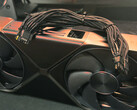In an upsetting series of deja vu, Nvidia's GeForce RTX 5090 and 5080 GPUs have been popping up online with melted GPU power connectors. When the first credible case of this popped up on Reddit, there was speculation that user error or inadequate cables may have been the cause of the melted connectors, but subsequent testing by renowned overclocker, Der8auer and tech YouTuber JayzTwoCents has dashed that theory.
First, an analysis by JayzTwoCents reinforced Der8auer's initial findings, where the latter was able to measure 22 Amps across a single pin in the 12VHPWR cable cluster. JayzTwoCents took a peek at a variety of 12VHPWR connector terminations under a microscope and found that some of the pins in the connector were significantly recessed and even differed in height before and after disconnecting the cable from a GPU. His conclusion from his testing is that the loose cable terminations would lead to increased resistance across that connection and increased current across other wires in the cable.
It should be noted that this manufacturing flaw seems to mostly be limited to older 12VHPWR cables that don't comply with the ATX 3.1 spec, which should mean newer cables supplied with ATX 3.1 PSUs will not suffer from this issue.
As Der8auer explains in a new video on YouTube discussing some of the criticism surrounding conclusions he came to after previous testing, Nvidia removed power sensing and balancing from RTX 4000 and RTX 5000 GPUs, meaning the graphics card doesn't detect how much power or current is being drawn from the various pins in the 12VHPWR connector. Being unable to sense this power draw means the GPU is unable to balance load across the various wires in the cable. This lack of load balancing means that the GPU will exit the per-connector 9.5 Amp specification if a situation like the aforementioned improper connection occurs.
All of this evidence suggests that there may be a manufacturing or design flaw in the cable terminations or plastic connector housings themselves, which is exacerbated by Nvidia's decision to remove power sensing and balancing from the RTX 4000 and 5000 GPUs.
At the time of writing, this testing does not appear to be conclusive, though, and more investigation may return other results further down the line. However, for the time being, it may be better to go with something like the AMD Radeon RX 7900 XT (curr. $749.99 at Best Buy) if you're looking to upgrade from an older or entry-level GPU, or to wait for a response from Nvidia or its AIB partners regarding the melting RTX power connectors.



























